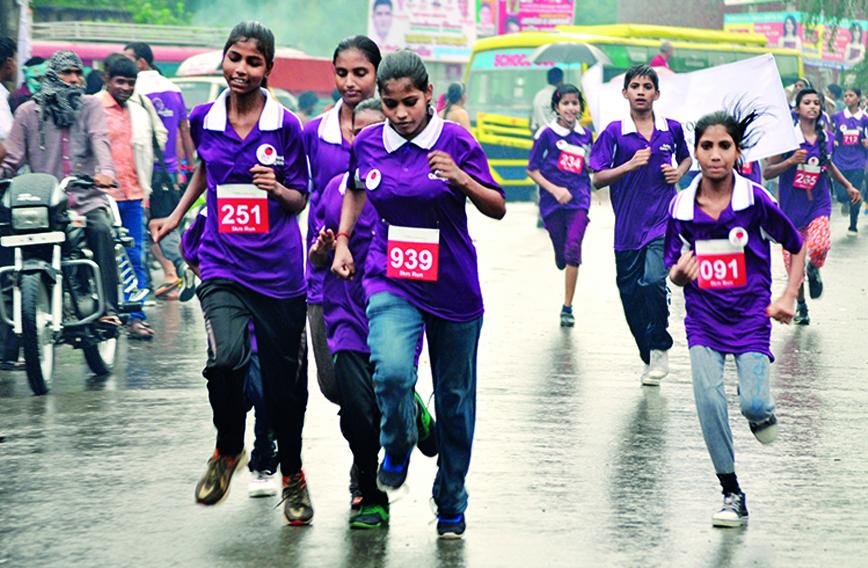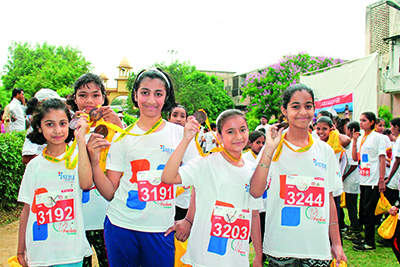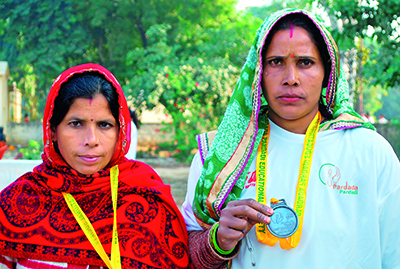
The marathon has become a celebration for every girl child as boys and girls from surrounding villages take part in the annual run for equality in rural Anupshahr
Rural marathon says it all for the girl child
Civil Society News, New Delhi
Every year, villages in Anupshahr tehsil of Bulandshahr district in Uttar Pradesh witness a unique event — a rural half-marathon. Thousands of girls and women, some even in saris, run through Anupshahr’s roads bathed in the early morning sun. The men, who were at one time gawkers, merrily join in solidarity with their womenfolk.
The residents of around 132 villages and surrounding areas look forward to this unusual event. It is organized by the Pardada Pardadi Educational Society (PPES) which runs schools for girls and skilling programmes for women in Anupshahr tehsil. This year 4,000 runners took part.
The man behind the idea of a rural marathon is Virendra Sam Singh who set up PPES in 2000 to educate the rural girl child. Today more than 1,600 girls study in the four schools run by PPES.
The first marathon was organized in 2014 to raise funds for PPES. Over the years monetary gains have been modest. But the marathon fulfilled another purpose — it raised awareness about girls’ education and improved the profile of PPES amongst villagers in the district.
“Today the marathon has become a celebration of the right to education for every girl child,” says Sam Singh with pride. He is happy to see the smiles and joy on the faces of thousands of participants in the marathon every year.
This rural run has three versions — the half-marathon (21 km) for the serious runner, the mini marathon (10 km) for the larger population and a ‘short’ run of five km for the very young and the elderly. It starts early, at around five in the morning, and winds its way through the villages and the Aligarh bypass.
Sam says the primary idea is to bring girls out in the open, especially in a region where patriarchy rules, for the world to take notice. This, he feels, will give these girls confidence and the self-belief to explore their own worth, and possibly create leaders in future.
Hundreds of women members of self-help groups also join in in their saris to encourage more girls to take part in sports and not be cowed down by the domination of males.
The CEO of PPES says, “This is more than just a run for girls or women. It is a great opportunity to show the world that no restriction can be placed on women because of their gender.”
The Pardada Pardadi Educational Society, a non-profit working in Anupshahr since 2000, envisions creating a society where rural women have a share equal to men in contributing to the growth of the nation.
To empower these rural girls who hail from the most disadvantaged communities, PPES provides them free all-round education and vocational training to prepare them for employment. The schools run from 8 am to 4.30 pm with day boarding facilities.
 The journey began when Sam returned to his ancestral village, Bichola, in Bulandshahr after spending 40 years with DuPont, an American multinational, as an engineer. Born in a feudal family, Sam was part of the patriarchal system and the rigid caste hierarchy that dominate rural lives, in particular, Bulandshahr. Troubled by the inherent gender inequality, Sam spent some time in the Dalai Lama’s school in Dharamsala in the late 1980s.
The journey began when Sam returned to his ancestral village, Bichola, in Bulandshahr after spending 40 years with DuPont, an American multinational, as an engineer. Born in a feudal family, Sam was part of the patriarchal system and the rigid caste hierarchy that dominate rural lives, in particular, Bulandshahr. Troubled by the inherent gender inequality, Sam spent some time in the Dalai Lama’s school in Dharamsala in the late 1980s.
Impressed by its self-sustaining model, Sam was to test it a decade later when he decided to set up schools for girls back home in Bulandshahr. In 2000, he set up the Pardada Pardadi Educational Society. Twenty-three years later, it’s come a long way. PPES provides quality education to girls from low-income rural families, providing midday meals, skilling programmes and a chance for the girls to follow the career of their dreams.
Inspired by a changing India and the need for women to play a greater role and drive this change, Sam wanted to do his bit. He feels that it is the girl child who goes on to be the mother and if the mother is educated then the whole family benefits and in turn, so does society.
 But rural India is still very conservative and it’s no different in Anupshahr. Young girls dreaming of taking part in sporting activities find little encouragement. The lack of resources keeps the girls homebound. This is where Pardada Pardadi (the reference to great grandparents is meant to link the past with the future) helps the girls break through by providing them the necessary encouragement and sporting gear to take part with the boys on an equal footing.
But rural India is still very conservative and it’s no different in Anupshahr. Young girls dreaming of taking part in sporting activities find little encouragement. The lack of resources keeps the girls homebound. This is where Pardada Pardadi (the reference to great grandparents is meant to link the past with the future) helps the girls break through by providing them the necessary encouragement and sporting gear to take part with the boys on an equal footing.
Though Sam remains ever hopeful of change, in these 23 long years has it changed enough? “Unfortunately not.” Society remains highly male-dominated because men still control the levers of power. Pointing out that women sarpanches are being elected in different parts of the country and this gives him hope, he says, “One day, I’m sure this will change and we can be a catalyst in that change.”
Comments
-

Mallika Sarabhai - Sept. 24, 2023, 10:26 a.m.
Fabulous




